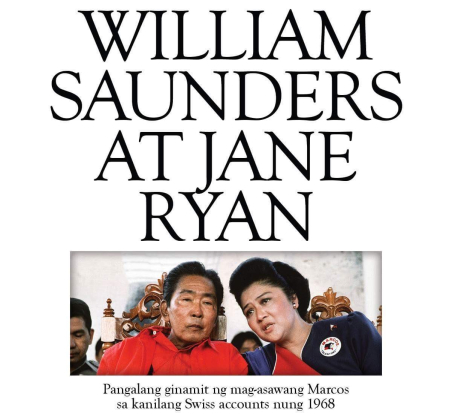With the Marcos-Duterte apologists in Congress moving to abolish (or otherwise marginalize) the PCGG, is there any chance that the Marcos’ stolen wealth can be recovered?
No doubt, the purveyors of fake news will be quick to defend this act by saying that there is nothing to recover in the first place. What is the reality? Time for a fact check….
Grand CorruptionProfessor David A.Chaikin of the University of Sydney explains the daunting challenges in recovering the stolen money in the book entitled Corruption and Anti-Corruption edited by Peter Larmour and Nick Wolanin:
A major obstacle in the recovery of the hidden wealth of the Marcos family is that the former President was a master manipulator of financial transactions and used an extensive and complex system of laundering monies through Swiss and offshore banks. Marcos did not generally use his own name in illegal transactions; instead he used nominees such as friends, cronies and layers of foundations and companies to conceal his activities. The Marcos family thrived on the idea of secret names. For example, in a letter dated 18 October 1968, Marcos informed his Swiss bank that the ‘word John Lewis will have the same value as our own personal signatures’… The Marcoses used every laundering scheme available to conceal their investments. At the same time his Swiss banks offered him various instruments of bank secrecy to protect his interests, such as numbered accounts, Liechtenstein Foundations and attorney with professional secrecy obligations. (p.102)

Despite all the difficulty, the PCGG has had some modest successes, recovering about ₱ 170 billion by December 2015. The following Inquirer article lists some of these assets in detail.
Where Marcos stashed multibillion loot
The following article from The Guardian narrates the history of the recovery effort describing it as a story of the PCGG “dragging victories out of the swamp”. Since it was written around the May 2016 elections, it also expresses alarm at the prospect of Bongbong Marcos becoming Vice-president.
The $10bn question: what happened to the Marcos millions?
The Birth of LeaktivismWithout an investigative agency like the PCGG, is there any hope to recover the rest of the Marcos loot? This is where perhaps we can look to the International Consortium of Investigative Journalists (ICIJ), an unstinting collaboration of hundreds of highly credible investigative journalists across the globe aiming to uncover the attempts of some of the world’s wealthiest politicians, businessmen, and sports and art personalities to misuse the global offshore banking system for fraud, tax evasion, evading international sanctions and other illegal acts. In the absence of a properly functioning Freedom of Information Law in all the different countries, this courageous band of journalists have taken it upon themselves to leak offshore financial dealings in an attempt to keep the world’s wealthiest individuals and corporations honest. (That said, the leaking of private information can be vastly controversial because not everyone with offshore deposits can be assumed to have committed a crime – a fact that ICIJ acknowledges.)
In 2015, 11.5 million documents that detail financial and attorney–client information for more than 214,488 offshore entities were leaked by an anonymous source. These documents – since called the Panama Papers – named 12 (then) current and former world leaders, 128 other public officials and politicians, and hundreds of other members of the elites of over 200 countries. Some of the names mentioned included Malcolm Turnbull, Silvio Berlusconi, Benazir Bhutto, Ronald Reagan, Stanley Kubrick, and officials from FIFA.
Irene Marcos Araneta, the youngest child of the dictator Marcos, along with her husband Gregorio Ma. Araneta III was named in the Panama papers. Both are listed as shareholders of Orient Wind Development Limited, registered in the British Virgin Islands.
Before the Panama Papers, there was the 2013 Offshore Leaks based on a cache of 2.5 million files containing information on more than 120,000 offshore companies and trusts worldwide, also revealed by the ICIJ. The ICIJ said that 86 journalists from 46 countries sifted through the data during their 15-month collaborative investigation. In the Philippines, the Philippine Center for Investigative Journalism (PCIJ) was the partner organization.
In the Offshore Leaks probe Ilocos Norte Governor Maria Imelda “Imee” Marcos Manotoc is revealed as one of the beneficiaries of the Sintra Trust, a company based in the British Virgin Islands. Named with Imee are her three sons—Ferdinand Richard Michael Manotoc, Fernando Martin “Borgy” Manotoc and Matthew Joseph Manotoc.
The Philippine references in the ICIJ Offshore Leaks Database
Just last November 2017, the Paradise Papers comprising of 13.4 million confidential electronic documents relating to offshore investments were leaked to the German reporters Frederik Obermaier and Bastian Obermayer from the newspaper Süddeutsche Zeitung. The newspaper shared them with the ICIJ’s network of more than 380 journalists. The papers contain the names of more than 120,000 people and companies. At 1.4 terabytes in size, this is second only to the Panama Papers in 2016 as the biggest data leak in history.
The Paradise Papers Explained in a Video
The database of the Paradise Papers has been recently catalogued and made public but there appears to be no early references to the Marcoses, although many wealthy Filipinos do appear.
Micah White, co-founder of Occupy calls this recent phenomenon as “leaktivism “. If this can evolve into a widely accepted ethical and professional counterbalance, then we may just be waiting for Imelda’s other shoe to drop.

- More





